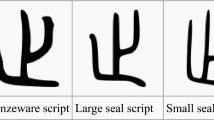Abstract
This essay sets out to search for an equivalent Chinese word to the English word ‘justice’ in classical Chinese language, through ancient Chinese philosophical texts, imperial codes and idioms. The study found that there does not seem to be a linguistic sign for ‘justice’ in classical Chinese, and further, yi resembles ‘justice’ in some ways and has been used sometimes to translate ‘justice’, but yi is a complex concept in traditional Chinese philosophy with multiple meanings and it is dissimilar to ‘justice’ in their semantic and pragmatic meanings in Chinese and English legal culture. While ‘justice’ is a keyword and fundamental to Western law, yi is not a legal word or concept in classical Chinese in traditional China. Given its complexity, yi does not have a one-to-one equivalent in English. It sometimes carries a sense of ‘righteousness’ and occasionally ‘justice’, but yi and ‘justice’ are not equivalent. In view of these, it becomes understandable that the translations of yi in contemporary Chinese usage vary ranging from ‘friendship and justice’ to ‘greater good’, among others. The meaning of yi is still uncertain and context sensitive as it was two thousand years ago.

Similar content being viewed by others
Notes
Yi tian is said to be an influential model for corporate ownership of land in ancient China first established by the Song Dynasty (960–1279) bureaucratic scholar Fan Zhongyan (989–1052) to provide benefits to his agnatic relatives [5].
Some believe that yi here is a shortened version of jieyi (avowed, or sworn) as in a ‘sworn child’ [6], or ‘avowed brothers’, meaning taking an unrelated child or brother through swearing loyalty or adoption. But the Chinese dictionary explains the meaning of this yi as ‘to call someone in name’, that is, to call someone ‘son’ or ‘parents’ through using the family name, that is, not through biological heredity. This usage of yi is still current today.
Legalism is a philosophical school of thought in early China active around the same time as Confucius during the Spring and Autumn and Warring States period (770B.C.–221B.C.), and one of the major schools alongside Confucianism, Daoism, and Mohism. The major thinkers in Legalism include Han Fei (d. 233 B.C.), Shang Yang (d. 338 B.C.) and Shen Buhai (d. 337 B.C.). Mohism is another main philosophic school fundamental to Chinese philosophy and culture during this same period but it is much less known than the others. Mohist main contributions are in the areas of philosophy of logic, rational thought and science to Chinese ancient thought and civilization. It later declined and parts of the thought of Mohism were absorbed by Legalism and some merged into the Daoism, disappearing as an independent school of thought (see Johnston [6]).
For other works in Confucianism, Legalism and Mohism in the corpus, see ctext.org.
Similarly, fa (law) also means ‘methods’, among other meanings. Thus, in Confucian works, fa is used in different senses, not just in the sense of ‘law’.
References
Staunton, S.G.T. 1810/1966. Ta Tsing Leu Lee, trans. Taipei: Ch’eng-Wen Publishing Co.
André, J.S. 2004. But do they have a notion of justice? The Translator 10 (1): 1–31.
Cao, D. 2018. Chinese language in law: Code red. Lanham: Lexington Books.
Jones, W.C. 1994. The great Qing code, trans. Oxford: Clarendon Press.
Chen, G. 2016. Castration and connection: Kinship organization among Ming Eunuchs. Ming Studies 74: 27–47.
Lu, T. 2002. Persons, roles and minds: Identity in Peony Pavilion and Peach Blossom Fan. Stanford: Stanford University Press.
Johnston, I. 2010. The Mozi: a complete translation. Hong Kong: The Chinese University Press.
Chang, W. 2016. In search of the way. Edinburgh University of Edinburgh.
Legge, J. 1970. The Chinese classics: With a translation, critical and exegetical notes, prolegomena, and copious indexes. Hong Kong: Hong Kong University Press.
Hall, D.L., and R.T. Ames. 1987. Thinking through confucius. Albany: State University of New York Press.
Cheng, C.-Y. 1997. Can we do justice to all theories of justice? In Justice and Democracy: Cross-Cultural Perspectives,ed. Ron Bontekoe and Marietta Stepaniants, Honolulu, University of Hawai’i Press, 181-198. In Justice and Democracy: Cross-Cultural Perspectives, R. Bontekoe and M. Stepaniants, Editors. 1997, University of Hawai’i Press: Honolulu. p. 181–198.
Van Norden, B. 2017. Mencius. In The Stanford encyclopedia of philosophy, ed. E. N. Zalta.
Peerenboom, R.P. 1990. Confucian justice: Achieving a humane society. International Philosophical Quarterly 117 (1): 17–32.
Xiao, Y. 1997. Trying to do justice to the concept of justice in confucian ethics. Journal of Chinese Philosophy 24: 521–551.
Turner, K. 1992. Rule of law ideals in early China? Journal of Chinese Law 6 (2): 1–44.
Alford, W.P. 1984. Of arsenic and old laws: Looking anew at criminal justice in late imperial China. California Law Review 72 (6): 1180–1246.
Wan, M.B. 2015. Court case Ballads: Popular ideals of justice in late Qing and Republican China. In Chinese law: Knowledge practice and transformation, 1530 s to 1950s, ed. L. Chen and M. Zelin, 287–320. Leiden: Brill.
Author information
Authors and Affiliations
Corresponding author
Rights and permissions
About this article
Cite this article
Cao, D. Desperately Seeking ‘Justice’ in Classical Chinese: On the Meanings of Yi. Int J Semiot Law 32, 13–28 (2019). https://doi.org/10.1007/s11196-018-9566-9
Published:
Issue Date:
DOI: https://doi.org/10.1007/s11196-018-9566-9




